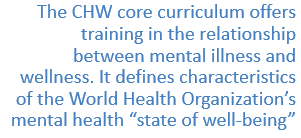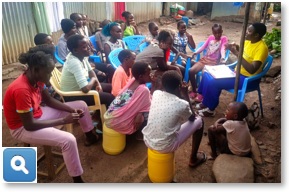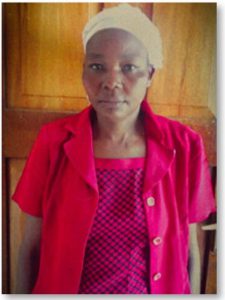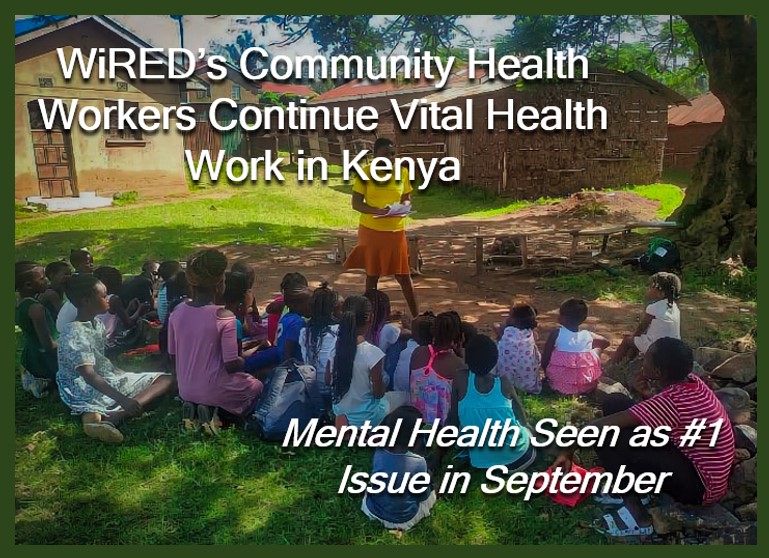By Allison Kozicharow; Edited by Elizabeth Fine
 In today’s world, fraught with disease, conflict and the disastrous impact of climate change, everyone’s mental health can suffer — especially for 75% of people with depression who live in low-resource regions where mental health services are in short supply.
In today’s world, fraught with disease, conflict and the disastrous impact of climate change, everyone’s mental health can suffer — especially for 75% of people with depression who live in low-resource regions where mental health services are in short supply.
 WiRED International community health workers (CHWs) take a brief course in mental health issues during their basic training, providing them with a fundamental understanding of signs to watch for in their communities. The CHW core curriculum offers training in the relationship between mental illness and wellness. It defines characteristics of the World Health Organization’s mental health “state of well-being,” and identifies the social, psychological and biological factors that impact mental health. The core training covers ways to promote mental health and maintain positive mental health throughout life. Further, the course identifies mental health illness and early warning signs of mental illness. If CHWs encounter community members who show key signs of mental health issues, they immediately alert the program manager for possible higher-level care.
WiRED International community health workers (CHWs) take a brief course in mental health issues during their basic training, providing them with a fundamental understanding of signs to watch for in their communities. The CHW core curriculum offers training in the relationship between mental illness and wellness. It defines characteristics of the World Health Organization’s mental health “state of well-being,” and identifies the social, psychological and biological factors that impact mental health. The core training covers ways to promote mental health and maintain positive mental health throughout life. Further, the course identifies mental health illness and early warning signs of mental illness. If CHWs encounter community members who show key signs of mental health issues, they immediately alert the program manager for possible higher-level care.
 Although mental health issues have surfaced in previous monthly reports, mental health concerns topped the list of medical subjects CHWs encountered this September.
Although mental health issues have surfaced in previous monthly reports, mental health concerns topped the list of medical subjects CHWs encountered this September.
How do our CHWs handle mental health issues in their communities? Here are two stories that tell the tale:
 During a community health session, I came across a man who was withdrawn and could not sit down. He was up and down and talking to himself. After class I talked with him one on one and he agreed to share his problems. He said his wife ran away with their three children because he lost his job and could no longer provide for his family. I counseled him and later referred him to services where a thorough diagnosis and counseling could be made. I checked up on him and he is now doing well. He is so appreciative and thanks WiRED so much.
During a community health session, I came across a man who was withdrawn and could not sit down. He was up and down and talking to himself. After class I talked with him one on one and he agreed to share his problems. He said his wife ran away with their three children because he lost his job and could no longer provide for his family. I counseled him and later referred him to services where a thorough diagnosis and counseling could be made. I checked up on him and he is now doing well. He is so appreciative and thanks WiRED so much.
— CHW Milka Nyadiang’a

During my field work I came across a family headed by a mother of five children, who said she was going through a severe depression. She shared with me that her husband, whom she loved so much, lost his job due to hard economic times. When he couldn’t attend to his household needs anymore, he ran away and left her with the children. I advised her to visit a professional counselor, she agreed and I sent her to a professional I knew. I also encouraged her to start a small business to support her family. In my follow-ups I learned that she is doing well. The church gave her some money to start her business. Now she is selling boiled and roasted maize (corn) and is managing to provide for her family, including paying school fees for the children.
— CHW Daniel Ayieko
Using WiRED modules, CHWs teach people how to recognize mental health issues and how to prevent and treat them, leading to referrals to clinics if appropriate. WiRED CHWs will continue to stress the importance of mental health as key to overall health and educate their communities to talk openly about depression and other anxiety disorders.
WiRED Modules Train CHWs to Provide Mental Health Services
WiRED’s Depression module defines depression and its clinical terms, signs and symptoms, causes, diagnosis, treatment and medication and explains how depression affects age groups and genders differently. Depression is harmful not only for the person with the disorder but for caregivers. Depression is a common, serious, treatable illness.
In addition WiRED offers a Postpartum Depression module as part of our Mother and Child Health Series, which guides mothers, fathers and their families from before pregnancy to pregnancy, labor, delivery and becoming a parent.
Mental Health Leads Topics in WiRED CHW’s Report This Month
During the month of September 2024, 19 CHWs in Kisumu, Kenya, reached a total of 8,696 people with health services. Working 24 hours per week, each of the CHWs met with at least 59 patients a week, and the largest number seen in a week by a single CHW was 192, most of them in health training classes.
In September, the top health-related issues were, as follows, in order of prevalence:
1. Mental health
2. Malaria
3. Handwashing
4. HIV/AIDS
5. Mpox
6. Gender-based violence
7. Hygiene



